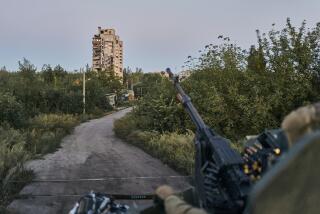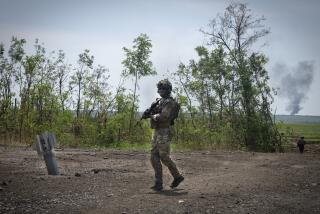Outside Ukrainian city, fighting continues ahead of truce’s start
- Share via
Reporting from Mariupol, Ukraine — The Ukrainian captain sat on a fallen tree amid drifting smoke, clutching his bare head, as the wreckage of an artillery convoy destroyed by enemy fire smoldered nearby.
“Don’t go out there, don’t look at the shame of Ukraine’s army,” he said with a moan, narrow lines of blood streaking slowly out of his ears and nose. “These cannons were meant to give hell to Russians. They didn’t fire a shot. Such a shame!”
A few hours before Ukrainian President Petro Poroshenko on Friday announced a truce designed to end his nation’s five-month battle with pro-Russia separatists in eastern Ukraine, Russian forces who recently joined the fight hammered troops outside this port city for several hours with missiles and rounds from artillery and mortar launchers.
War was drawing closer to Mariupol, and even amid talk of the coming truce residents feared for their city, strategically located on the highway between Russia to the east and Russian-held Crimea to the west.
As Ukrainian troops in another military convoy heading to the fight stopped for a coffee break at a Mariupol gas station, a civilian approached the lead vehicle and handed an officer a piece of paper. “My daughter drew this for you,” he said with tears in his eyes. “Please defend us and our families.”
The drawing showed a white horse draped in the blue-and-yellow Ukrainian flag, trampling a fallen large brown bear draped in the Russian flag. It was signed “Katya from Donetsk.”
After the pounding they took early in the day, the troops responded before the 6 p.m. deadline for the cease-fire with an attack of their own. And the fighters from the Azov Battalion, a volunteer militia, did so with apparent confidence.
“During World War II, Russians swore they would end the war in Berlin,” said a soldier, who, like others in the unit, gave his code name: “Kiss.” “I have a vision that I sit on a tank with a glass of horilka [Ukraine traditional hard liquor] in Red Square and watch the Kremlin being painted yellow and blue.”
The Ukrainian counteroffensive destroyed a battery of four Russian self-propelled cannons and several 120-millimeter mortar launchers, killing troops that manned them. One launcher was seized intact and later displayed to the media, said a battalion spokesman code-named “Baida.”
“The offensive, which was really a big surprise for Russian troops outside the city, had to stop short when the clock struck 6 and troops had to go back to their positions,” he said. “The enemy stopped responding with fire too.”
When fighters from the battalion met later to discuss the battle, most of them were openly displeased with the cease-fire.
“We don’t need a truce with the aggressors,” said a 45-year-old former carpenter from Kharkiv known as “Paliy.” “We need to stop calling this an anti-terrorist operation and instead call it what it is: a war. We need to fight this war to the end and win it at any cost.”
At that moment his cellphone rang. He listened for a bit to the manager of his bank before interrupting her: “Listen up, lady! How dare you bother me about my debt of 140 hryvnia [$11] when I am fighting out here for you and my country. And anyway your bank is a Russian bank, so please forget my number and don’t call me anymore as we are at war.”
No casualty count for the day was released; earlier in the week defense officials said more than 800 Ukrainian troops had died so far in the conflict. In Russia, dozens of soldiers have been buried in recent days in low-profile funerals with no mention of service in Ukraine included on their headstones, Russian liberal media reported.
As Friday drew to a close with the first quiet night of the week, the personnel officer of the Azov Battalion, code-named “Sanyaba,” was still hard at work. He was registering a long line of volunteers, most of them young men wanting to fight against what they see as Russian aggression -- despite the newly declared truce.
“Your last name?” the officer asked a skinny, freckle-faced man in his early 20s. “Ivanov,” the man replied. The most popular Russian name.
More to Read
Sign up for Essential California
The most important California stories and recommendations in your inbox every morning.
You may occasionally receive promotional content from the Los Angeles Times.










